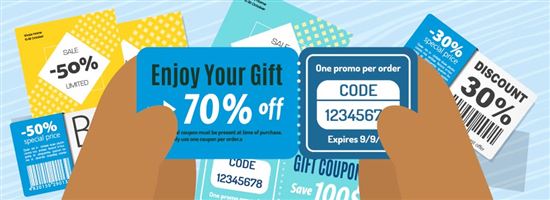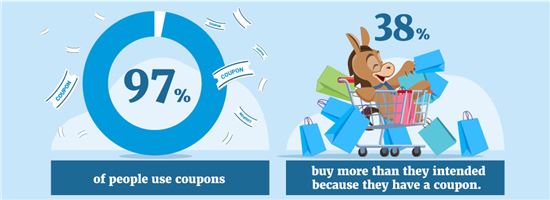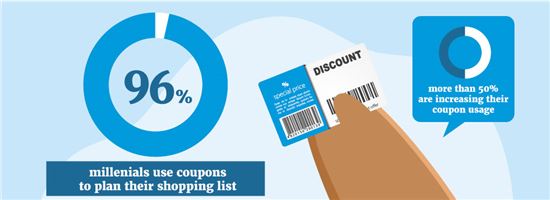Coupon Statistics
Yes, coupons are still thriving. See how coupons continue to drive record sales for merchants and big savings for consumers.
 |
Still think coupons are for grandmas? Coupons have gone way beyond the Sunday circulars. You don't even need scissors for many of them anymore.
You can print them out and flash your smartphone screen to a cashier to get credit. You can even carry over a coupon code to an online shopping cart. Coupons are easier to find than ever. And people often get a deal.
Clear up your assumptions about the coupon industry with these statistics.
Everything You Need to Know About Coupons
 |
94% of people use coupons and 38% buy more than they intended because they have a coupon. Among frequent coupon shoppers, 83% had coupons affect their purchasing behavior.
87% of low-income households, 86% middle income households, and 85% of high-income households admit to looking for deals.
89% of consumers named price as the top factor when making a purchase, while 82% named quality. By comparison, only 45% said the brand was the main factor. Meanwhile, for online purchases, the most influential factor is free shipping.
85% of consumers are willing to shop at multiple stores for the best deals and 82% switch stores based on weekly specials. 39% of them bought a new brand because of a coupon. 86% try new products because of coupons.
- 45% of consumers report using coupons often, if not always.
- 62% of consumers check store circulars for coupons to match items on their shopping list.
- 93% of consumers use paper coupons while 75% use paperless coupons.
- 67% of consumers made an unplanned purchase solely because of a coupon or discount.
- 81% of consumers would take additional action, such as enrolling in a loyalty program, to redeem a rebate or coupon.
- 50% of consumers use digital coupons while shopping in-store.
- 82% of consumers redeem a digital coupon within a week of being clipped and 30% redeem these within a day.
The value of digital coupon redemptions is estimated to be $91 billion by 2022. While mobile coupons are projected to account for nearly 80% of all coupon redemptions by 2022. 80% of coupons are redeemed from traditional print media.
Most consumers prefer single-use coupons with higher discounts as opposed to lower-value coupons redeemable more than once.
How Much Are Americans Savings with Coupons
Every American could get more than 1,000 coupons a year.
Between the Sunday paper, flyers going out each week, and offers sent out digitally—Americans are receiving a ton of coupons each year. In 2016, a whopping 169 billion of these little money-savers were distributed in the U.S. That's a thousand for each of us.
Break it down and the savings are just $11.60 per year per person: Most people do use coupons at some point. But the biggest savings are going to the savviest coupon users.
Individual coupon value is declining: Coupons aren't worth quite as much as they used to be. In 2012, the average coupon was worth $1.57; in 2013, it dipped ever so slightly to $1.56.
The average redemption amount has also decreased: As face values went backward, redemption values also faced a decline in 2018. The average redemption value is $1.21, which is an average of 6 cents less than 2013 figures.
Coupons are worth some serious cash: It might not seem like coupons could add up to much money. But you'd be surprised at their collective value. The coupons issued in 2013 were worth $513 billion, a jump of $15 billion over 2012's total.
Who Is Using Coupons
 |
Most everyone you know uses coupons. A great thing about coupons is you can use them to save money on just about anything. And most people are doing just that, in huge numbers.
In fact, 96% of Americans report using coupons at least occasionally.
But a few do so reluctantly. Almost 50% of women shoppers called coupons "a necessary evil".
Frequent coupon users include high earners: Nearly half of the people who make $150,000 or more use coupons at least 50 times a year.
Millennials are surprisingly cost conscious: Young adults in the 18 to 34 range get a bad rap when it comes to their spending habits. But they're actually more saving-savvy than they get credit for. Over 96% say they use coupons to plan their shopping list. And more than 50% are increasing their coupon usage.
Millennial parents, especially dads, are inclined to use paper coupons. 92% of them use print coupons while 88% use paperless coupons through a mobile device or loyalty card.
Online coupons are gaining ground with older shoppers: Seniors are catching on to the pleasure of redeeming online coupons and promo codes. In 2016, the percentage of people aged 50 and over who used online coupons more than doubled from 7% to 17%.
Tablet users redeem them more often: Oddly enough, the kind of mobile device you use determines how likely you are to use a virtual coupon. 57% of tablet users redeem mobile coupons while just 40% of smartphone users do the same.
Grocery store coupons are just a small portion of the deals out there: In 2013, 60% of printed coupons were for non-food items, such as clothing, cleaning products, restaurant meals, and office supplies.
How Do Companies Give Out Coupons
More companies are marketing coupons via text.
Getting targeted with advertisements through your phone can be annoying. But not when it gives you a chance at keeping more cash in your pocket.
In 2018, 34.9% of consumers said they used their phones to receive coupons through text messages. And 59% said they'd like to get them more often if there was no cost involved.
There's a reason retailers send coupons to your inbox: Emails that feature a coupon earn retailers 48% more revenue than other promotional messages.
Social media has turned into a coupon club: At peak crazy couponing, moms would meet up at the library to trade their carefully cut-out deals. Now those shares are happening on Facebook and Twitter and mostly by younger folks. In 2013, 40% of young adults traded and swapped coupons on social media.
There's no sign of retailers cutting back on how many coupons they send out: The total distribution rate for coupons declined by 11.7% from 2017 to 2018.
Mobile coupons are catching on fast: Technology is making it easier to do just about everything these days, including saving money on the things you buy. In 2019, 21% of shoppers said they rely mostly on mobile coupons to save, compared to just 15% in 2014.
How Do People Use Coupons
Serious savers don't wait to take advantage of offers. Some coupons are good for months. Others require you to act quickly in order to snag a great deal.
Slightly over 91% desktop users redeem online coupons within a few days. Nearly one-third of coupons found via smartphone or tablet are used immediately.
Nearly half of non-coupon users blame time for their lack of interest: Non-coupon users say the time limit that's usually the biggest obstacle. Over 60% of people said their coupons expired before they ever got a chance to use them. On the other hand, 49% said it took too much time and effort to find them.
Some shoppers don't mind the aggravation: Nearly 80% said they'd love it if coupons could be applied automatically to their purchases at checkout. And 70% said they wish retailers would mail them coupons. These high figures show some shoppers will put up with coupons if they're able to find deals. Some even like the hunt.
Shoppers are cutting back on cutting: Printed coupons still dominate the industry, but they're not quite as popular as they used to be. Only 63.9% of shoppers said they used them in 2016, versus an astonishing 58% in 2014.
Coupons are to blame for many shopping splurges: For 69% of shoppers, the availability of a coupon influenced whether they made the purchase.
25% is usually the tipping point for sealing a deal: 43% of shoppers agree that clipping coupons is a good investment of time when the discount is worth up to 25% off.
Bottom Line
Coupons can be good and bad. They can definitely lend a helping hand if you're looking for a sweet deal. But, you shouldn't buy something only because you have a coupon for it.
There are billions of coupons being given out every year. Companies give them out to motivate you to buy their products. But, it's smarter to use them only on things you were going to buy either way.
So, shop smartly and remember to use coupons to your advantage.
Sources and References
Rebecca Lake is a journalist at CreditDonkey, a personal finance comparison and reviews website. Write to Rebecca Lake at rebecca@creditdonkey.com. Follow us on Twitter and Facebook for our latest posts.
|
|
|









